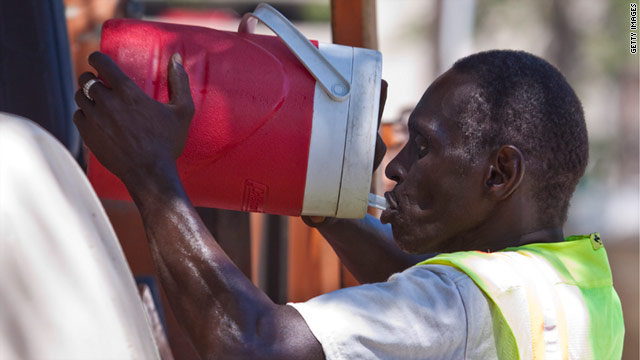Blazing temperatures scorch much of southern U.S.

- Heat advisories are posted for 14 states
- July was hottest month ever recorded in Texas
- Texas is in the midst of its most severe one-year drought
- Animals take advantage of their human neighbors to stay cool
Dallas (CNN) -- Another day, another assault on the air conditioning systems of America.
A spell of suffocating heat will grip much of the South again Friday. Heat advisories are in place for parts of 14 states. People from New Mexico to North Carolina will feel the extreme heat, according to the National Weather Service.
The developments come as several cities in Texas closed in on records for the most consecutive days of 100-degree heat.
On Thursday, Dallas marked its 34th straight day of temperatures above 100 degrees. That city has been getting a lot of attention for its hellish heat, but some smaller Texas cities have had it worse. Thursday was Waco's 35th straight day topping 100 degrees, and it marked Tyler's 38th. The record for both Dallas and Waco is 42 straight days over three digits, set in 1980.
In some places, the heat is having deadly consequences.
 Rising heat, record prices?
Rising heat, record prices?
 Nudists strip down to beat the heat
Nudists strip down to beat the heat
A Kansas City, Missouri, endurance race known as the "Warrior Dash" had one of its participants die Saturday after collapsing on the course, CNN affiliate KMBC reported.
Family members of Jeremiah Morris said the 28-year-old's core temperature had increased to 111 degrees. His blood thinned, and his organs were damaged, they told KMBC.
Organizers of the race canceled its last leg after Morris and 12 others were rushed to the hospital from the course due to the heat.
Not only are temperatures high in Texas, but the state climatologist said Thursday that Texas in the midst of the most severe one-year drought on record. Recordkeeping began in 1895.
Last month was also the hottest month ever on record in Texas and the third driest July, climatologist John Nielsen-Gammon said.
"Never before has so little rain been recorded prior to and during the primary growing season for crops, plants and warm-season grasses," he said.
"The outlook is not entirely grim," he added. "Late August and September bring increased chances of widespread rain from tropical disturbances, as well as the occasional cold front. Some computer models predict a return to La Nina conditions this winter, which would imply continued dry weather, but most predict neutral conditions in the tropical Pacific and the possible return of normal weather patterns."
Citing record-breaking electricity demand, the Public Utilities Company of Oklahoma urged users to decrease the amount of electricity they are consuming. It also recommended setting thermostats to 80 degrees and postponing use of dishwashers, washers and driers.
Despite the searing temperatures, Texas on Thursday ended a three-day string of record electricity usage.
"Electricity demand for Friday is expected to be lower ... but we are still asking consumers and businesses to conserve ... due to the unusually high demand and the increased risk of generation outages during these type of conditions," said Kent Saathoff with the Electric Reliability Council of Texas, which manages the state's power grid.
The record energy consumption comes in an attempt to keep millions of humans cool.
But even animals are looking for ways to beat the heat. CNN iReporter Becky Draper of northern Wisconsin caught a family of bears taking a dip in a kiddie pool she puts out for her dog.
She said she can't blame them for taking advantage of it.
"Imagine what it would be like to don a heavy winter fur coat in sweltering hot summer weather -- makes me sweat buckets just thinking about it," she said.
Another iReporter, Maria Ciski of Wichita, Kansas, has a neighborhood squirrel that uses the moist soil of her hibiscus planter to bring his temperature down a notch.
"The squirrel ... is quite a little character. He waits patiently for me to water my hibiscus and the surrounding plants and he comes down out of the tree to cool himself," she said.
"On really hot days he will lay there, patiently, for most of the day."
CNN's Ed Payne and Nicole Saidi contributed to this report.
